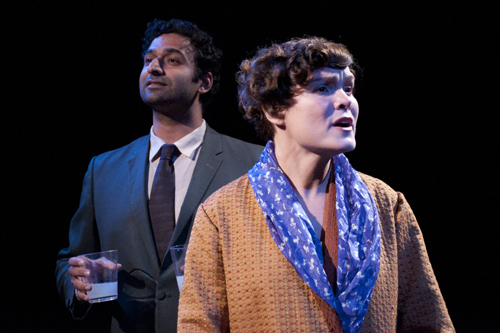By Andrew Hamlin
Northwest Asian Weekly

Bhushan Mehendale (Coomaraswami) and Caitlin Frances (Flora Crewe) (Photo by Ken Holmes)
Tom Stoppard’s far-ranging play “Indian Ink” spans two continents, at least one ocean, and several decades. Yet it begins simply enough, with a young man and an older woman sitting at a table for tea. As the action progresses, we learn a bit more about tea and a lot more about the two.
Before too long, though, the tea table, stage right, dims, and the action plunges center stage. A young Englishwoman, Flora Crewe (played by Caitlin Frances) arrives in India with her luggage. She narrates the action around her out loud, and we understand that her narration becomes letters, written to her sister and being read out back at the tea table. Her sister, Eleanor Swan (Betty Campbell), is the older woman, sharing the letters with an American, Eldon Pike (Scott Ward Abernethy), a professor and writer devoted to Flora Crewe’s life and work.
Pike has already given the world a collection of Crewe’s poetry, edited by himself, of course. He’s anxious to squeeze every last detail he can about Eleanor’s sister into a new biography of Flora Crewe, written by himself, of course. As Eleanor will confide to another of her visitors, Anish Das (Moish Gangwani), Pike is vainglorious enough to think himself the definitive word on the life of her sister, and clueless enough to not figure that she doesn’t know his machinations. She doesn’t want a biography of her sister to be written. Pike, therefore, is waiting, not entirely patiently, for her death, to give him a green light.
This is only one of many strands thrown around by Stoppard’s narrative, as it moves in time and space. The tea table stays put, but multiple layers mid-stage, courtesy of scenic designer Phillip Lienau, approach, and then recede, pulled and pushed by cast members.

Scott Ward Abernethy (Eldon Pike) and Gurvinder Pal Singh (Dilip) (Photo by Ken Holmes)
A narrative this complexly rich makes it difficult for any performer to take over, but Caitlin Frances does get more front-and-center time than anyone else. She takes over anytime the lights come up on her, evincing a tough but sensitive woman, flirty and audacious, and confident on the surface, but all too fallible on the inside. She’s introduced to Nirad Das, (Dhiraj Khanna), an artist who wants to paint her. But between his English, her poetry, and his canvas, they fall into complicated miscommunications.
Nirad will eventually father Anish Das, but the two men are never seen together. Anish, in his own timeline, wonders a great deal about his late father, even as he pretends to be nothing but an English-habituated sophisticate. Alienated relatives come up frequently in “Indian Ink.” So does miscommunications, lost correspondence, and lost stories. We in the audience are pretty sure we’ve unraveled everything start-to-finish. Reasonably sure, but never positive. And the beguiling pieces of the big story are not at all in the right order.
Much is made over what it is to be Indian, over all this time and fuss. And the true meaning of what it is to be Indian does of course change over time, as UK rule, symbolized by the Union Jack, gives way to home rule. I happened to watch the play on the evening of August 15th, the anniversary of Indian Independence from the UK. I had no idea how much history lay behind that one date. “Indian Ink” can’t cover it all of course—it attends to decades, well and truly, but not centuries.
But it fixes the political into the personal, with diligence, comedy, and heartbreak. (end)
“Indian Ink” plays through August 30th at the Center Theatre, 305 Harrison Street, Seattle Center Armory at Seattle Center (lower level, below the Food Court). It is a co-production of Sound Theatre Company and Pratidhwani.
For prices, showtimes, and more information, visit http://www.soundtheatrecompany.org/2015-sound-theatre-seattle-season-now-showing/indian-ink.
Andrew Hamlin can be reached at info@nwasianweekly.com.



